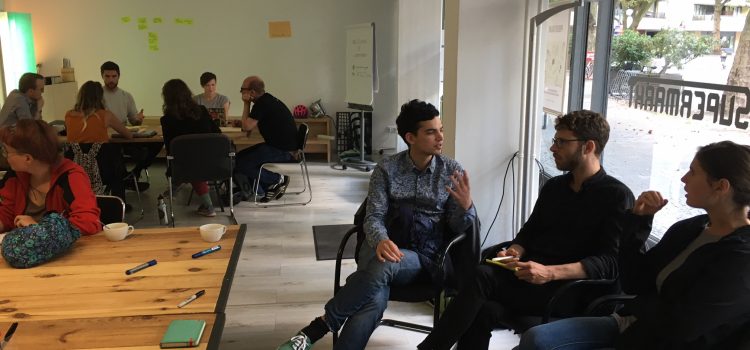Summary of the Platform Coop meetup on September 20th, 2017 at SUPERMARKT:
When we invited people for our latest #platformcoop meetup we didn’t have a particular agenda in mind. Our main interest was to call everyone who is currently in Berlin and associates with the concept and ideas of platform cooperativism – no matter whether they run a coop themselves or whether they are researching about coops or planning to design one in the near future.
This open invitation brought a diverse and international group of people together: Local colleagues, who run spaces and networks, like Wigwam, Vanilla Way, Thinkfarm, B-Tours or the arts network berlinerpool. The team from Wechange, a local coop of changemakers and transition initiatives, helped to organize this meeting. We also had a number of guests who travelled from far (not only for this meetup, of course 😉 representing groups like Green Net, Buy Twitter, Enspiral, also activists like Katie Hudson, who wrote this article about our meetup: https://medium.com/@katiehudson/on-re-defining-platform-co-ops-3c3824c26bd9
While we had our round of intros we tried to compile the different interests and expectations everyone had for this meeting. Together, we looked at the input and tried to group it, so we could form four different workgroups. And these were the 4 main topics we have shaped workgroups around:
Finance & Community Currencies
Most inspiring question: What would the world look like if online platforms such as Facebook, Airbnb, Uber, Google, Amazon would be user-owned?
The Buy Twitter-Initiative has already taken an interesting step into that direction. Read more about their proposal here: https://www.buytwitter.org/proposal/
Starting from this example, it became clear that the entire sector of cooperative businesses is in need of innovative funding models. Obviously it’s important to widen our perspective when we talk about funding: Rather than just discussing fundraising as if this would be an isolated factor, we need to invent agreements for making relationships around meaningful financing. This might even start at the level of language: is there a way to reconcile the language of finance with the language of care? Think: investment, risk, assessment, quantification, return, impact together with the notion of care (as something oppositional to all these concepts. Is there a way to link these domains?). Overall, platform coops need better financial frameworks and maybe also a directory for „appropriate funding“. There are already quite interesting online resources, like the one Katie Hudson mentioned: http://www.goodfinance.org.uk/
Also, the book Funding the Cooperative City has just been launched, an open access book about community finance and the economy of civic spaces.
What cultural practices and activities support cooperative work?
Sharing patterns and stories
This group was all about the nature of coops and collective work. How to shift the focus from individual ambitions and workloads towards the potential of working and learning in groups? What kind of thinking do we need to adopt in order to design a collaborative work environment? The workgroup reflected about opportunities that are too big for individuals, but could be tackled from a freelancer coops that is able to pair skills and resources. (For those who don’t know about it: there are actually coops like that developing in Berlin these days, like CZY WRK, Wigwam, Smart or Wechange. Of course, they are not all the same and they adress different audiences, but the basic idea is similar: Help making everyone’s freelance life easier, creating a certain standard of security for each member, pooling resources and services for everyone, designing a place where everyone feels they belong not only in terms of work compatibility, but based on their personalities, too. Each of these examples are still in progress and young, but the people working behind the scenes have already lots of interesting learning to share – so why not getting in touch with them and share some insights?
Besides the cultural and structural aspects which apparently have been heavily discussed the workgroup also talked about a few concrete formats and tools that can help facilitate exchange and collaboration. Agile work methods, project clinics where people can asked others for help when they get stuck with their work, time banks and forms of value exchange. By the way: Damian, who facilitated this session, works with Enspiral, a foundation of social enterprise ventures and social entrepreneurs working together with shared vision and values. They have developed great tools for collaboration, such as Loomio. Loomio is an open-source web application that helps groups make better decisions together. Enspiral has also developed Cobudget, a tool that helps groups to allocate funds. I want to encourage everyone to look into their work, as there is a lot to learn from!
Making cultural coops work
Most people who joined this group are either building cultural coops themselves or they run spaces and wanted to discuss the meaning of space for culture-based platform coops. Besides space as a primary resource, people also talked about the need for artist run initiatives to build strong relationships in ordert o make their work more sustainable.
Interesting examples were presented from Israel and France: First of all, the Artist-Run Alliance, an international platform for artist run initiatives – a term typically including artist co-operatives, independent galleries and art spaces. This alliance just came into life and seeks supporters!
A Berlin equivalent might be the Koalition der Freien Szene. This coalition of independent arts gathers all artists and initiatives working in freelance structures in the fields of art in the city of Berlin. No matter what genre or format everybody is working in, they collaborate for a strengthening and higher financial support for independent art production.
Generally, there are many good examples of artist-run initiative and cultural coops. Here is an interesting online directory: http://cultural.coop/directory
Their idea is to encourage collaboration, mutual support and solidarity among cultural co-ops. This initiative provides information about the co-operative model for anyone looking for alternatives to often individualised, precarious and exhausting working lives in the cultural sector.
They also showcase a collection of individual stories, which I find particularly useful.
The platform coop ID
Designing a membership/ community infrastructure that provides access to tools, spaces, networks and funding. This was probably the most practical case: how to develop something like a common „motherboard“ for an entire network of coops? What do coops and coop aware individuals need as a direct service for a cooperative way of living, working and changemaking? With a platform coop membership ID, what elements would you hope to find in the bundle of offers? To what “good” services would you like to get an easy access? It’s crucial to find out about the needs of potential members and how much it’s worth to them in order to create products and services that can be financially sustainable. What would have been useful to you when you were setting up your initiative, project or coop?
Following up on this idea, it would also be very interested to explore the idea of a platform coop ID as something that creates a local reference across different ccoops. This would also help to create political impact, too. In times, where more and more public infrastructure is taken over by commercial interests, the local rise of coops is not just a remarkable economic phenomenon, but also a strong signal towards local structures of democratization and participation.
Thanks to Peter Hartmann and Markus Kollotzek from Green Net for their write-up of our meetup in German: https://greennetproject.org/de/blog/bericht-vom-platform-coops-berlin-meetup
Also many thanks to Katie Hudson for challenging the common definition of platform coops in this article: https://medium.com/@katiehudson/on-re-defining-platform-co-ops-3c3824c26bd9
Many people have expressed the wish to continue the conversation, so the next meetup will take place on November 28th at 3pm at SUPERMARKT! Hope to see you (again) soon!

